SNAP for U: The what, why, and how
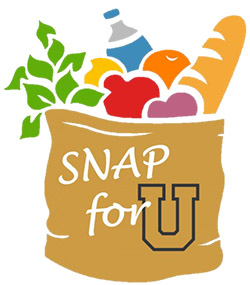 The SNAP for U Project was developed through a collaboration of MOCAN’s Food Systems Work Group members in 2020. The team consists of professors from University of Missouri Kansas City and Missouri Southern State University as well as Extension Professionals from the University of Missouri. The team has also included contributions from a variety of graduate and undergraduate students from a variety of fields (Social Work, Health Sciences, Graphic Design).
The SNAP for U Project was developed through a collaboration of MOCAN’s Food Systems Work Group members in 2020. The team consists of professors from University of Missouri Kansas City and Missouri Southern State University as well as Extension Professionals from the University of Missouri. The team has also included contributions from a variety of graduate and undergraduate students from a variety of fields (Social Work, Health Sciences, Graphic Design).
Food insecurity is a complex issue facing about 10% of the general population in the United States today. Previous research suggest rates in college students is about 4 times higher. Research shows lack of sufficient food and nutrients have significant negative academic outcomes. Some institutions offer food pantries, but this is a band-aid for a chronic issue.
During the COVID-19 pandemic, the USDA expanded eligibility criteria for college students to utilize Supplemental Nutrition Assistance Program (SNAP) benefits. The SNAP for U team formed with the goal of learning more about rates of food insecurity in Missouri college students within various institution types, knowledge of SNAP benefit potential eligibility, barriers and facilitators for college students applying for and accessing SNAP benefits.
Goals
The goals of the project are to gain information surrounding food insecurity in Missouri’s college and technical school students, spread awareness of the data collected, and ultimately end stigma surrounding college students applying for and utilizing SNAP benefits. Use data collection to increase awareness of institutions on what they can be doing to assist their students.
Projects
- College Student Survey: This was the first project we did to gain some base knowledge about what was going in with Missouri students. We surveyed 9 higher education institutions across Missouri, asking questions about SNAP knowledge, food insecurity rates (we used a validated survey to assess food insecurity), facilitators and barriers for college students utilizing SNAP benefits, what foods they thought SNAP benefits should be able to be used on, and more. We had over 800 students across 9 higher education institutions including public, private, technical, community colleges, and one historically Black college or institution (HBCU). Our team used the results of this initial survey to inform future work.
- College Student Focus Groups: After the student survey, we conducted online focus groups to understand what students think colleges can do to assist with reducing their food insecurity. We asked them to expand more on facilitators and barriers to accessing SNAP benefits.
- Toolkit for College Students Designed by College Students: Our research showed many college students didn’t really know much about what SNAP was, so we wanted to create a resource for college students to learn about SNAP. We had some undergraduate students draft a toolkit with valuable information and design that was appealing and applicable to them. Our plan is to share the toolkit once it’s been piloted.
- College Administrator Interviews: After interviewing college students, we wanted to learn from people working at institutions with students, so we decided to interview administrators to get their take. We interviewed 5 administrators from various institution types to inform how to distribute a survey.
- College Administrator Surveys: After interviewing administrators, we sent out surveys to college administrators at different institution types, asking them about their knowledge of food insecurity rates in students, SNAP knowledge including exclusion criteria, and which institutional department(s) should help students with food insecurity.
- Nutrition Program Associate (NPA) Interviews: We conducted online interviews with nutrition professionals whose job is to enroll people in SNAP, asking them questions about their experiences in working with college students to aid them in enrolling students in SNAP benefits.
- Nutrition Program Associate (NPA) Surveys: We sent online surveys to NPAs to assess their thoughts on how to address food insecurity in college students across Missouri.
Contact us
If you’d like to get in touch with our team, feel free to reach out to Candace Rodman, the Executive Director of the Missouri Council for Activity and Nutrition (MOCAN), or contact the other team members:
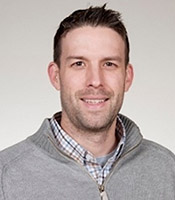 Matthew Chrisman is an Associate Professor in the School of Nursing and Health Studies at the University of Missouri-Kansas City. He received his BS in Health and Exercise Science from Missouri Western State University in St. Joseph, MO, his MS in Kinesiology from Kansas State University in Manhattan, KS, and his PhD in Community and Behavioral Health from the University of Iowa’s College of Public Health in Iowa City, IA. He also completed a postdoctoral fellowship in Community Nutrition at Texas Tech University, followed by a second postdoctoral fellowship in Epidemiology at the University of Texas MD Anderson Cancer Center in Houston, TX. Dr. Chrisman is a member of MOCAN, the American Public Health Association, and the Society for Public Health Education, and serves on the Executive Committee and Steering Committee of the Greater KC Food Policy Coalition. He enjoys cooking and traveling with his daughter and son.
Matthew Chrisman is an Associate Professor in the School of Nursing and Health Studies at the University of Missouri-Kansas City. He received his BS in Health and Exercise Science from Missouri Western State University in St. Joseph, MO, his MS in Kinesiology from Kansas State University in Manhattan, KS, and his PhD in Community and Behavioral Health from the University of Iowa’s College of Public Health in Iowa City, IA. He also completed a postdoctoral fellowship in Community Nutrition at Texas Tech University, followed by a second postdoctoral fellowship in Epidemiology at the University of Texas MD Anderson Cancer Center in Houston, TX. Dr. Chrisman is a member of MOCAN, the American Public Health Association, and the Society for Public Health Education, and serves on the Executive Committee and Steering Committee of the Greater KC Food Policy Coalition. He enjoys cooking and traveling with his daughter and son.
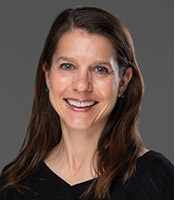 Andrea Cullers is a Professor and Department Chair in the Kinesiology Department and Director of the Lion Co-op Center for Nutrition Security at Missouri Southern State University in Joplin, Missouri. She received her BS HES in Dietetics and Nutrition from the University of Arkansas, her MS from University of Kansas Medical Center in Clinical Nutrition and her PhD from the University of California, Davis in Nutritional Biology with an emphasis in Community and International Nutrition. Dr. Cullers is a Registered Dietitian Nutritionist and completed her internship KUMC. Dr. Cullers has served as chair of the Missouri Council of Activity and Nutrition Food Systems Workgroup and Steering Committee, she is a member of MOAND, Academy of Nutrition and Dietetics and the Empower MO Food Security Coalition. She also serves as chair of the OneJoplin Health Team and is a member of the Community Health Collaborative and the Joplin Area Food Action Network in her community. Andrea loves playing outside and exploring the world with her husband and 9-year-old son, Asher.
Andrea Cullers is a Professor and Department Chair in the Kinesiology Department and Director of the Lion Co-op Center for Nutrition Security at Missouri Southern State University in Joplin, Missouri. She received her BS HES in Dietetics and Nutrition from the University of Arkansas, her MS from University of Kansas Medical Center in Clinical Nutrition and her PhD from the University of California, Davis in Nutritional Biology with an emphasis in Community and International Nutrition. Dr. Cullers is a Registered Dietitian Nutritionist and completed her internship KUMC. Dr. Cullers has served as chair of the Missouri Council of Activity and Nutrition Food Systems Workgroup and Steering Committee, she is a member of MOAND, Academy of Nutrition and Dietetics and the Empower MO Food Security Coalition. She also serves as chair of the OneJoplin Health Team and is a member of the Community Health Collaborative and the Joplin Area Food Action Network in her community. Andrea loves playing outside and exploring the world with her husband and 9-year-old son, Asher.
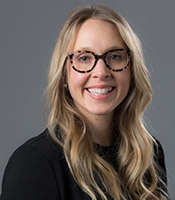 Kelsey Gardiner, M.S.E., PH.D. is an Assistant Teaching Professor in the School of Nursing and Health Studies at the University of Missouri Kansas City (UMKC). She received both her Master’s and Doctorate degrees from the University of Kansas (KU) studying Health Education and Exercise Psychology with a focus on nutrition and physical activity. She has previous experience working at the community level as a health educator and nutrition services coordinator, and in leadership roles as the chair of the Healthy Food for All workgroup in Douglas County and The Food for Jayhawks committee at KU. Her research has been focused mostly on community and public health nutrition. This encompasses food systems, healthy eating behaviors, food insecurity and access to healthy foods, and food as a social determinant of health. Currently she is an active member of the UMKC Food Insecurity Committee, Missouri Community Health Improvement Plan (CHIP) Committee, the Community and Public Health Nutrition Research Interest Group with the American Society of Nutrition, and is collaborating on research projects related to improving food systems and SNAP access.
Kelsey Gardiner, M.S.E., PH.D. is an Assistant Teaching Professor in the School of Nursing and Health Studies at the University of Missouri Kansas City (UMKC). She received both her Master’s and Doctorate degrees from the University of Kansas (KU) studying Health Education and Exercise Psychology with a focus on nutrition and physical activity. She has previous experience working at the community level as a health educator and nutrition services coordinator, and in leadership roles as the chair of the Healthy Food for All workgroup in Douglas County and The Food for Jayhawks committee at KU. Her research has been focused mostly on community and public health nutrition. This encompasses food systems, healthy eating behaviors, food insecurity and access to healthy foods, and food as a social determinant of health. Currently she is an active member of the UMKC Food Insecurity Committee, Missouri Community Health Improvement Plan (CHIP) Committee, the Community and Public Health Nutrition Research Interest Group with the American Society of Nutrition, and is collaborating on research projects related to improving food systems and SNAP access.
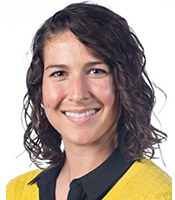 Allene Gremaud holds a Master’s Degree in Science in Health and Human Physiology with an emphasis in health promotion from the University of Iowa. Allene works for the University of Missouri Extension for both the Missouri Council for Activity and Nutrition (MOCAN) and Community Health Engagement and Outreach (CHEO). With MOCAN, Allene works with studying food insecurity in college students. With CHEO, she works in the area of substance use disorder (SUD), trying to educate and reduce the stigma of people who use substances. One effort is through Recovery Friendly Workplaces, working with employers to educate them on the disease of addiction, and supporting them in hiring people with SUD. Allene has been with the university since March of 2019 and MOCAN since the fall of 2020.
Allene Gremaud holds a Master’s Degree in Science in Health and Human Physiology with an emphasis in health promotion from the University of Iowa. Allene works for the University of Missouri Extension for both the Missouri Council for Activity and Nutrition (MOCAN) and Community Health Engagement and Outreach (CHEO). With MOCAN, Allene works with studying food insecurity in college students. With CHEO, she works in the area of substance use disorder (SUD), trying to educate and reduce the stigma of people who use substances. One effort is through Recovery Friendly Workplaces, working with employers to educate them on the disease of addiction, and supporting them in hiring people with SUD. Allene has been with the university since March of 2019 and MOCAN since the fall of 2020.
 Candace Rodman holds a Master’s Degree in Sports Science and Rehabilitation through Logan University. She serves as the Missouri Council for Activity and Nutrition (MOCAN) Executive Director which acts to unify MO organizations, healthcare professionals, educators, government officials and public health entities to create policies that better the health of Missourians. When not working, she volunteers for the Huntington’s Disease Society of America and serves as Chair of the Mayor’s Council for Physical Fitness and Health.
Candace Rodman holds a Master’s Degree in Sports Science and Rehabilitation through Logan University. She serves as the Missouri Council for Activity and Nutrition (MOCAN) Executive Director which acts to unify MO organizations, healthcare professionals, educators, government officials and public health entities to create policies that better the health of Missourians. When not working, she volunteers for the Huntington’s Disease Society of America and serves as Chair of the Mayor’s Council for Physical Fitness and Health.